
17 December 1915
BARNOLDSWICK FAMILY’S PATRIOTISM
It has become a trite saying that there is scarcely a family anywhere but has its representative taking part in one capacity or another in the great struggle. The question has often been asked, in the same connection, which particular street in Barnoldswick has returned the largest quota to the Colours. Pro rata this distinction is claimed for Bankfield Street, Coates, whose six houses are represented by eleven men who have joined since the outbreak of war. One of these, Pte. Jas. Parkinson, of the 2nd Duke of Wellington’s, has been a prisoner of war in Germany since the action at Hill 60 in May last.
But the honour of sending the largest quota from a single home probably belongs to the family of Mr. W.H. Pickering, 13, Clayton Street, Long Ing, all of whose five sons are serving in the Army, two of them at the Front. Mr. Pickering, who is 65 years of age, is a retired overlooker, who came from Haslingden to Barnoldswick six years ago. He has a family of five sons and two daughters.
The eldest son, Pte. Herbert Pickering, of the King’s Own Scottish Borderers, is now in France. The second, Pte. Harry Pickering, of the 5th Worcester Regiment, is at Tregantle Fort, Cornwall. The third, Pte. Philip Pickering, West Riding Regiment, is at Saltfleet, Lincolnshire. Pte. Wm. Pickering, the fourth son, has had seven years’ service with the 2nd East Lancashire Regiment, part of which he spent in India and South Africa. He has been with the Forces in France about fifteen months, and was recently home on a week’s furlough.
Pte. Abraham Pickering, the youngest member of the family, joined the 3/5th East Lancashire Regiment about a month ago and is in training at Southport.
08 February 1918
BARNOLDSWICK SOLDIER’S EXPERIENCES AS A GERMAN CAPTIVE
Private James Parkinson, West Riding Regiment, has recently been transferred to Switzerland after enduring two-and-a-half years’ captivity in the hands of the Germans. He is now in hospital at Fribourg (Switzerland), and in a letter to his wife, who resides with her mother in Bankfield Street, Coates, he gives a few glimpses of the brutal treatment to which he was subjected at the hands of his ‘cultured’ captors.
“I was sent to Russia in 1916 (he writes), and the ‘good treatment’ we got was the cause of all I have had to go through since. In the first place just fancy me eating ‘spud peelings,’ for we could get nothing else. That started my illness, and since then I have been in bed, which of course was only of wood (nice thing for a sick person!). You ask to see a special doctor, and get your teeth knocked out with the butt end of a rifle! After being in bed for six months I was told to get up and dig a drain, which I could not, being too weak. It ended up in being kicked and knocked about again, unconscious for four hours without a doctor, and unable to walk since. A short story in a nut-shell, but I could fill books about the ‘good treatment’ our lads have had, if only I were able to write long enough. There is only one thing I wish for now – that is to be able to do guard in some camp in Blighty. I think I could speak enough German to make them understand, and if they didn’t, well the old method – the butt and no grub. I am not saying this for the censor, but you have been kept in the dark long enough. And I might say I was not long enough in the fighting line to get medals and badges, but I know one thing, and that is that all the lads who were in Russia ought to be thought of for the way they stuck it with smiling faces and English hearts. Now I will bring my letter to a close, hoping the doctors I am now under will succeed in making me all right again.”
Private Parkinson is a brother of Driver Thos. Parkinson, R.F.A., upon whom has been conferred the Military Medal.
12 July 1918
NEARLY THREE YEARS IN GERMANY – ROUSING WELCOME TO A BARNOLDSWICK RETURNED PRISONER OF WAR
Scenes of hearty rejoicing quite unprecedented were witnessed at Barnoldswick on Saturday afternoon in connection with the return to home and kindred of Private James Parkinson, West Riding Regiment, after three years’ incarceration in the hands of the Germans. On arrival at Barnoldswick by the 5-27 train he received a semi-official welcome at the hands of Cr. W.H. Maude, Dr. Glen and Mr. J. Heald, while outside the station he was greeted by an immense crowd who cheered lustily as he took his seat, accompanied by his wife, in a motorcar and escorted by a guard of honour composed of the local Cadets and Boy Scouts, headed by a brass band, experienced something like the triumphal progress of a conqueror right to his home at 5, Bankfield Street, Coates.
Private Parkinson, who is 34 years of age, enlisted on December 1st, 1914, and went to the Front in the following April. He was captured at Zonnebeke, near Ypres, on May 5th, 1915, having been slightly wounded and gassed. After sixteen days in hospital in Belgium he was placed in prison at Roeclese[Roeselare?], awaiting transfer to an internment camp at Munster, Westphalia. Up to this point his treatment had been nothing to complain of, but on being sent to a working camp at Gelsen Kershen he, along with many others, positively refused to perform the task allotted him, and after a time was returned to Munster Camp. Later, on reporting sick, he was sent to Senelager, where he received punishment owing to his persistent refusal to work on munitions, and was again sent back to Munster, remaining a few months. In May, 1916, he formed one of a working party of 2,000, in four divisions, drafted to the Baltic province (Russia) to work on railway construction. “As per usual most of us refused (he commented) and laughed at the orders given by our taskmasters, even though we had to suffer for it.” After visiting Libau, Windau, Mittau, and Riga (the latter having been captured by the Germans) he became so weak and emaciated owing to bad and insufficient food that he spent most of the time in hospital–“a kind of hospital more like a pigsty.” On reporting sick at Riga he had his front teeth knocked out, and was nine weeks before he was able to see a doctor. “The best dinner I had there was boiled potato peelings, and it was a scramble to get even that. We could not get our parcels through owing to the railway not being completed.” Eventually, however, he was discharged from hospital and returned once more to Munster; thence to Berlin for medical examination and inoculation, and back again to Munster; later, sent to Minden, and a second time to Berlin, when he formed the opinion that the food problem had become acute. After a short period at another camp (Hestenmoor) he was transferred to Saltau internment camp, where after lying in bed ten months he received the welcome news that he was to be sent to Switzerland. A further six weeks (spent on the German side of Lake Constance) elapsed, however, before this desired consummation was reached, and he landed at Friborg (Switzerland) on the 28th November last in a prostrate condition, being quite unable to stand. The free air of Switzerland and the splendid hospital treatment restored him sufficiently to allow of being transferred to London, though still in a very weak condition, on March 1st this year. A six weeks’ stay in King George’s Hospital enabled him to come north, first to Halifax, then to Leeds, and at last “home to Barnoldswick, the best place in the lot.” Though still looking weak and wan Mr. Parkinson has recovered the use of his limbs, and, happy in the possession of a good appetite and an unconquerable spirit, will, it is hoped, soon regain his wonted health and vigour. He is now awaiting his final discharge from the Army. The family desire especially to thank Mrs. Wilson and neighbours, as well as the public of Barnoldswick generally, for the splendid reception accorded to the returned hero.
29 August 1919
BARNOLDSWICK – Military Funeral
Yesterday (Thursday) afternoon, in a drenching rain, the remains of Pte. Parkinson were interred with full military honours at Gill Cemetery. A detachment of 24 men of the 1st Devon Regiment, stationed at Skipton, were in attendance in charge of Lieut. Seeth. The burial service at the house and at the graveside was conducted by Mr. Geo. E. Bradley (of Earby) in accordance with the rites of the Spiritual Church. Cr. W.H. Maude and Mr. Wm. Harrison attended as representatives of the Barnoldswick War Pensions Committee.
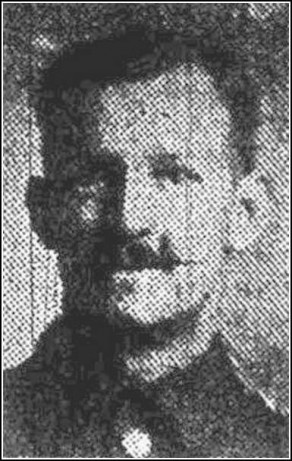
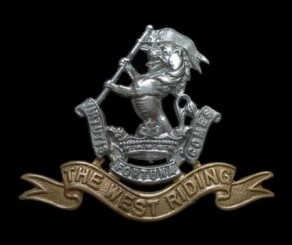


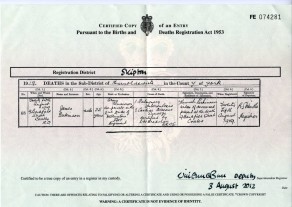
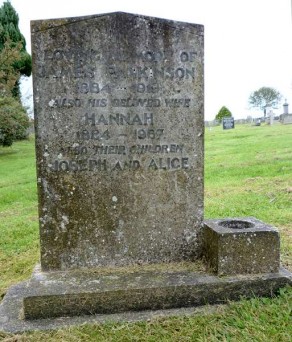
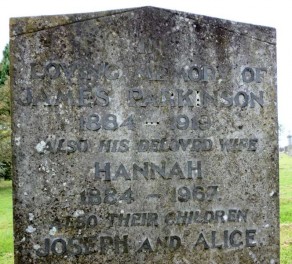





No comments yet.